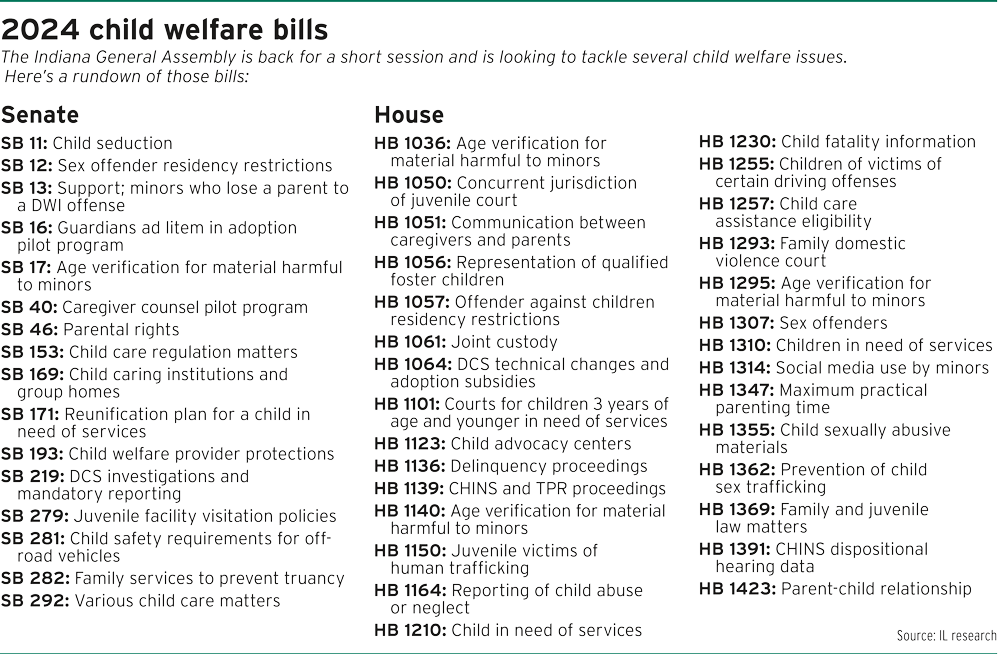Subscriber Benefit
As a subscriber you can listen to articles at work, in the car, or while you work out. Subscribe NowDespite 2024 being a short legislative session, Indiana lawmakers are considering dozens of bills specifically related to child welfare.
The proposed bills cover a wide range of family-related issues, from joint custody matters to the creation of new pilot programs and beyond.

Nicole Goodson, executive director of strategic initiatives at Kids’ Voice of Indiana, said her organization is tracking several bills this legislative session.
One of the bills she’s following closely is Senate Bill 16, which would create a two-year guardian ad litem pilot program in LaPorte, Marshall and Starke counties. The program would require a court to appoint a GAL in an adoption proceeding if the parent of the child has an intellectual disability and is subject to guardianship.
“We just have some questions about the logistics of that and how that’s going to work,” Goodson said.
She said Kids’ Voice is waiting for clarification about how the pilot program would work before weighing in on whether they are in favor of the bill.
Goodson added that for Kids’ Voice’s program in Marion County, the group has enough GALs if the pilot program were implemented there. But in other counties across the state, that isn’t the case. In some counties, she said, there is a waiting list, and some struggle to find enough volunteers or trained people to serve as GALs.
“I think in particular the part of this bill that asks the county to fund the program — it’s sort of a requirement without any funding to support — that could definitely be a challenge for those counties for sure,” Goodson said.
SB 16 has already passed the Senate and is awaiting assignment to a House committee. Another bill of note that Goodson mentioned is House Bill 1150, which deals with juvenile victims of human trafficking.
Another bill of note that Goodson mentioned is House Bill 1150, which deals with juvenile victims of human trafficking.
HB 1150 provides that if a petition alleges a child is a child in need of services as a victim of human or sexual trafficking, the juvenile court must make a determination on the petition and:
• The child shall not be required to admit or deny the allegation, and
• The petitioner must prove the allegation by a preponderance of the evidence.
Goodson said Kids’ Voice is in favor of the bill and hope it makes it out of committee.
“We think that this is in the best interest of kids, especially if they are allegedly victims of human trafficking,” she said.
The bill is awaiting a hearing in the House Judiciary committee.
There is also House Bill 1061, a bill pertaining to joint custody, that would provide that both biological parents have joint legal custody unless otherwise provided by law.
Goodson said that while the bill has good intentions, custody matters are not always simple.
“I think it creates some complicated situations the way it’s currently written,” she said.
Like HB 1150, HB 1061 is awaiting a hearing in the House Judiciary Committee.
Reporting requirements

Rob Shive, an attorney with Emswiller Williams Noland & Clarke LLC in Indianapolis, said there are a few bills that he’s watching, as well.
One is House Bill 1230, which requires the Indiana Department of Child Services to “disclose to the public certain information regarding child fatalities or near fatalities.”
Shive said HB 1230 is interesting because he isn’t sure how the bill defines “near fatal.”
“I’m for anything that makes the Department of Child Services disclose more information to the public,” he said. “They operate in a clandestine method, and what they do does not ever look good in the light of day. So I guess without knowing exactly what the child fatality or near fatality information is that they’re looking for, anything that forces the DCS to possibly have public review is probably a positive thing.”
HB 1230 was referred to the House’s Family, Children and Human Affairs Committee, which has not scheduled a hearing on the bill.
Shive said in general, he would like to see proposed legislation that promotes more transparency and accountability of DCS.
“Things that they do to families that they later are able to hide behind agency immunity is mind-boggling,” he said. “They utilize the confidentiality of their area — which is really supposed to be designed to protect children and their parents — as their own personal shield against this accountability.”
A DCS spokesperson declined to comment on pending legislation.
House Bill 1164, which involves the reporting of child abuse or neglect, passed out of the Family, Children and Human Affairs Committee on Jan. 25 and has been referred to the Courts and Criminal Code Committee.
That bill would require staff members of a medical institution, a medical facility or any other health care facility to report an incident involving alleged child abuse within two hours to both DCS and the local law enforcement agency.
It also would require that if a report alleges a youth coach is the abuser, the department must investigate to determine whether the school or athletic facility reasonably should have known that the alleged abuse was happening.

Rep. Victoria Garcia Wilburn, D-Fishers, added an amendment to the proposed bill in committee that clarifies that the definition of “child” in Indiana’s child abuse and neglect statute includes individuals between 18 and 21 years of age who reside or previously resided at a residential care facility licensed by DCS.
“This is about empowering DCS to do their job,” Garcia Wilburn said in a news release.
She referenced an investigation by the Indianapolis Star and ProPublica into Pierceton Woods Academy and its parent organization, Lasting Change. Pierceton Woods describes itself as a “qualified residential treatment program offering placement for young men with substance abuse issues or sexually maladaptive behaviors.”
The investigation found that DCS screened out — or deemed not worthy of investigation — reports of sexual abuse or inappropriate behavior because a resident turned 18 before the report was made.
“Some of the most vulnerable young Hoosiers who have already experienced extreme trauma reside at residential care facilities like Pierceton Woods,” Garcia Wilburn said. “The law should be crystal-clear that DCS has an obligation to protect children under their care who turn 18 but still reside at a residential facility through the age of 21. It’s my hope that this language, when it becomes law, will help DCS better protect all the children under their watch.”
Reunification vs. removal
On the issue of child removal, House Bill 1310 provides that if a child is removed from their parent for at least 12 of the most recent 22 months at the time of a periodic case review, the child’s permanency plan must include at least one intended permanent or long-term arrangement for care and custody of the child other than reunification.
The bill’s author, Republican Rep. Ryan Lauer of Columbus, said sometimes, the conditions and environment aren’t in the best interest of the child, so the court may switch the permanency plan to adoption or guardianship.
“House Bill 1310 recognizes the importance of preparing for alternative placement in the event that reunification fails, and we must ensure that the ultimate outcome serves the best interests of these precious children by being prepared in the event that all reasonable efforts fail to reunify,” Lauer said.
Indianapolis mother Ashley Hutchinson testified on HB 1310 bill in the Family, Children and Human Affairs Committee, stating she has come back almost every year to support the bill.
Hutchinson told the story of two boys who she has been trying to adopt for years, but the termination of parental rights hearing keeps getting rescheduled.
“But we should have had permanency in 2018, 2019, 2020, 2021, 2022 and it looks like 2023,” she said. “Possibly it is going to happen in 2024.”
Hutchinson said most recently, the termination hearing was rescheduled for May without reason.
HB 1310 passed out of committee unanimously and is on the House’s second reading calendar for Jan. 29.•
Please enable JavaScript to view this content.

